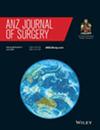Management of Acute Gallstone Disease in Older Adults and Associated Outcomes
Abstract
Background
Older adults (≥ 65 years) present with complex Acute Gallstone Disease (AGD) and can deteriorate rapidly, necessitating time-critical decision making. We describe AGD presentation, management, and associated outcomes in older adults.
Methods
Older adults with AGD between May 2021 and April 2022 were identified from a prospectively maintained dataset, including age, Clinical Frailty Scale (CFS) and co-morbidities. Data pertaining to diagnosis, management, and outcomes (mortality, discharge destination, readmissions) were collected retrospectively.
Results
Of 122 older adults with AGD, 63.1% were vulnerable or frail, 80.3% were moderately or severely co-morbid, and 54.1% had Acute Calculous Cholecystitis (ACC). 43.9% were managed with antibiotics alone, 28.8% via Early Cholecystectomy (EC), 21.2% via Percutaneous Cholecystostomy (PC), 4.5% with Endoscopic Retrograde Cholangiography (ERCP), and 1.5% palliated. The EC cohort was less frail and less co-morbid (CFS = 3, CCI = 3, p = 0.05) compared to those managed non-operatively. Inpatient mortality was 13.3% post-PC and 0% post-EC (p = 0.03). 38.5% of those managed with antibiotics alone represented at 90 days, as did 40% post-PC. In contrast, post-EC, 83.3% were discharged directly home, with 4.17% (p ≤ 0.01) readmitted at 90 days.
Conclusion
Older adults presenting with AGD have frailty and co-morbidities, and ACC is the most frequent presentation. 28.8% of ACC was managed via EC, which was safe and effective, with > 80% discharged home, < 5% 90-day readmissions, and no inpatient mortalities. Readmission was highest post PC and antibiotics. Frailty, co-morbidities, procedural and anaesthetic risk, and associated clinical outcomes need to be considered when managing AGD in older adults.


 求助内容:
求助内容: 应助结果提醒方式:
应助结果提醒方式:


